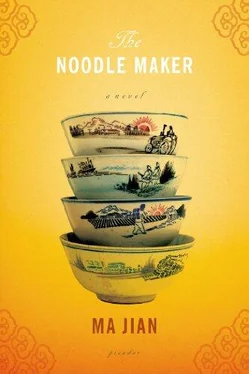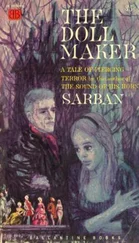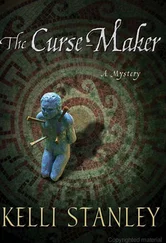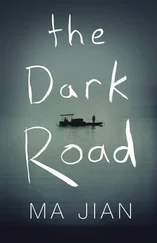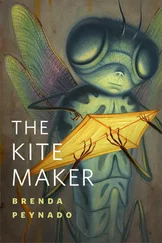As the old hag sank to the floor, he heard a rustling noise from inside the chest. Two mice scuttled out from under the bed and jumped into the lowest drawer of his desk.
‘Why not put an end to it now? You’ll have to go sooner or later, so you might as well get it over with. Ha! I see our belongings are still here. At least you haven’t stolen anything.’ The rustling noise came to a stop. He put his hand over his lungs and heart to check whether he was still alive. When all the sounds died down, he sat up in his bed, turned the light on and waited for dawn to break.
Early next morning, he returned to his corner of the street. It was a fine day. He could tell there was no wind because the plastic bag wasn’t moving and the white clouds in the sky were perfectly still. Squatting down against the wall, he hunched his shoulders and wondered why his spirits were so low. Perhaps he was upset by the old hag who had pestered him last night, or by what the mother of the actress had told him the week before, or perhaps the strain of writing so many letters every day was finally taking its toll. Having lived away from his family so long, his thoughts often drifted back to his hometown, although the sight of the white plastic bag always flicked him back to the present as fast as the snap of a rubber band. Now, as he squatted in the corner, he remembered how, as a child, when the maple leaves were turning red, he had walked up to a tree, his eyes brimming with tears, pulled out a pencil and carved into the trunk the words ‘Help me! Help me!’ Even from an early age, he liked to write down words to express what was on his mind. He remembered standing for hours in front of a shop counter gazing at the fountain pens he couldn’t afford to buy; running all day along the banks of a river after his mother had slapped him in front of his classmates; secretly grieving for a girl next door who had committed suicide; pulling out the first shoots of grass in spring and rolling naked over the bare earth.
Now, as a man of thirty, he felt that the hopes that each new spring had promised were empty and deceitful. He had discovered that the stages of his life’s journey were in fact as neatly mapped out as the Chinese characters on the pages of his draft letters. He knew he presented a pitiful sight, and that his mind was filled with dry and meaningless memories. The old hag who had badgered him last night was right — he was a piece of scum, stuck by gob to the street corner.
He picked up his pen. Whatever happened, he knew he had to write. Two peasants who had asked him to draw up a complaint were standing patiently by his side. They had travelled into town to report that their village Party secretary had murdered a widow and her children. After the street writer finished the letter, he helped them post it and invited them for a meal. When the peasants looked up at him gratefully from the restaurant table and squeezed the white dumplings in their trembling black hands, thoughts filled his mind once more. He had seen many peasants like them before, on the trains he took back to his hometown. They lived like cockroaches, scuttling from one place to the next, struggling to make a living. He thought of how, when they sat in the trains, the smells of rancid food wafting from their fake leather bags would merge with the stench from the toilets at the end of the carriage.
Whenever he returned home, he felt as frail and vulnerable as a silkworm that had just shed its cocoon. His residency permit would forever be fixed to his place of birth; he had no back-door connections to help him apply for a transfer. The only way he could survive in this coastal town was to melt into the background. He seldom entered shops, and only visited the public showers once a month, making sure to sneak in just before closing time. He only dared fetch water from his outside tap in the middle of the night. To avoid washing his clothes and then having to hang them out to dry, he just scraped the oil and dirt from shirt collars every four days with the blade of his letter knife. He took his meals at one dumpling stall whose owner he trusted. He always left his shed early in the morning, before any of his neighbours were up. He was amazed he had managed to survive all these years without raising any serious alarms.
‘Look at her make-up! She looks like a painted eggshell!’ he mumbled, staring at a woman passing by on the street. He was shocked by this comment. He buried his head in his hands, grabbed a piece of paper and scribbled: ‘I really have gone mad this time. Nothing seems real.’ As the nib of his pen scratched across the page, the image of himself as a child flashed through his mind again. He saw himself aged six, climbing out of a box, looking up with large moist eyes and crying, ‘Let go of me! I can get out by myself.’ He grabbed the child and placed him down on the ground. The boy crawled across the floor, and suddenly one of his legs fell off. Then his head fell off, and rolled towards the beam of light slanting through the window. ‘You’re not real,’ he said, walking over to the child and digging out the eyes from his face. He then saw the child’s eyes displayed in a shop window. A fat woman bought the eyes and walked off with them, and he chased after her through a maze of narrow streets. It was a dream that had recurred for thirteen years.
‘Those eyes see everything,’ he often sighed, when he woke up from this dream. ‘When I rise into the sky, I will fly like a bird.’
Walking home at night in the lamplight, he often saw the dismembered child falling to the ground like a feather. But tonight, as he approached the intersection in the centre of town, the old hag’s words still racing through his mind, his thoughts cleared, and a terrible sense of guilt descended upon him. He felt ashamed of his dishonest profession, and all the love he had helped destroy. He had wanted to lead an honest life, but there was no place for honesty in this town.
In the silent hours before dawn, he was still awake, writing at his desk.
‘Only through suffering can man gain wisdom. People who have never suffered are incapable of growing up. Happiness is a wooden cabin one finds after a long and difficult journey; people who take the easy path never get to see it. The unhappiness I’ve suffered in the past has been other people’s unhappiness. It has left no mark on me.’
When the rake-thin street writer saw the truth at last he laughed out loud. He thought about what the mother of the actress had told him, and about the hundreds of love letters he had written. Although his clients had exploited his creative skills, they had supplied him with a great deal of knowledge. The women’s intimate revelations had allowed the virginal street writer to mature gracefully. He realised that he had finally overcome his shyness and embarrassment, and that it was now time for him to seek out his own love. Stunned by this idea, he jumped onto his bed and stood still for a moment. He was elated. He would never have believed that the day might come for him to embark on a real love affair of his own.
‘But whom shall I love?’ he asked himself. Blushing, he thought of Chi Hui, the young woman from a distant province to whom he had written passionate love letters for an entire year. A fortnight ago, he had been ready to strangle his client for all the pain he had caused her. The love that had fallen from her letters like snowflakes had made him dizzy with confusion.
He pushed the cynical words of the actress’s mother to the back of his mind, sat down on the ground and leafed through all the correspondence relating to Chi Hui. A strange passion welled up in his heart. He wanted to conduct a love affair with a woman all by himself. He wanted to suffer the agonies of love. He wanted to kiss someone, conquer them, adore them. He wanted a woman of flesh and bone. A thin layer of sweat moistened his face. He laughed with delight as he looked through the drafts of the letters he had sent Chi Hui. He realised he loved her, that perhaps he had always loved her. In these letters, he had written descriptions of her beautiful hair, teeth, dimples and breasts, and between each word and every line he had left traces of his love.
Читать дальше
